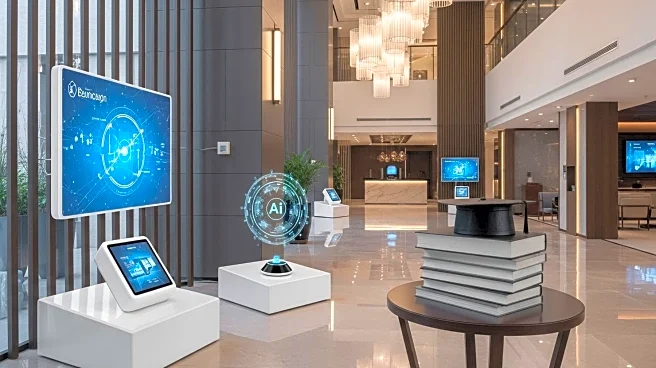What is the story about?
What's Happening?
The hospitality industry is experiencing slow adoption of digital transformation and AI technologies compared to other sectors like retail and travel tech. This lag is attributed to past technology projects that failed to deliver expected returns on investment, solutions perceived as disconnected from practical hotel operations, and budget constraints exacerbated by online travel agencies and rising costs. A significant barrier is the lack of understanding among hoteliers about the tangible benefits of AI-driven tools in daily operations. The industry tends to adopt guest-facing AI technologies, such as chatbots and automated email offers, which are perceived as safe and revenue-generating. However, operational AI tools, which promise faster returns on investment, are less adopted due to skepticism and a lack of clear understanding of their value.
Why It's Important?
The slow adoption of AI and digital tools in the hospitality industry has broader implications for operational efficiency and competitiveness. Hotels that fail to embrace these technologies risk inefficiency and irrelevance in a market pressured by labor shortages, rising costs, and fierce competition from online travel agencies. Conversely, hotels that strategically adopt AI-powered operational tools can lower costs, improve staff morale, and enhance guest experiences, gaining a competitive advantage. The shift towards cloud-based solutions has made digital transformation more accessible, allowing hotels to unify operations and scale AI-powered tools without heavy capital investment.
What's Next?
For smaller and mid-sized hotels, the path forward involves starting with AI-powered quick wins that demonstrate tangible returns on investment. This approach builds confidence and momentum for broader digital transformation. Vendors are encouraged to focus on educating the market rather than overselling features, helping hoteliers understand the categories and benefits of AI tools. The AIDURIX Compass is introduced as a navigation system to guide hotels in identifying operational friction points, exploring AI solutions, and designing a transformation path tailored to their specific needs.
Beyond the Headlines
The adoption of AI and digital tools in hospitality is not just about technology; it involves a cultural shift towards understanding and integrating these tools into daily operations. The education gap is a critical barrier, and addressing it can transform skepticism into trust, facilitating smoother transitions to digital operations. This transformation is not a one-time overhaul but a guided journey that requires strategic planning and execution.















